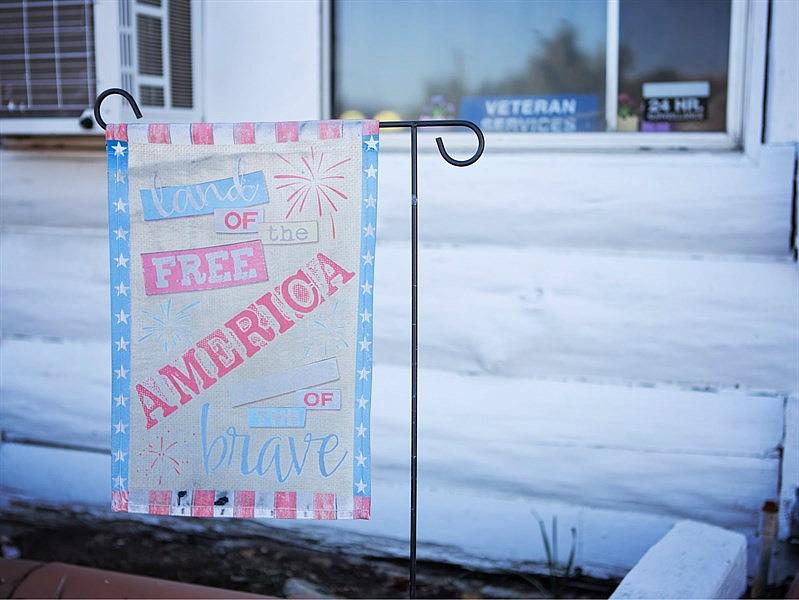Why Veterans Face Heightened Suicide Risk in Amador County and Other Rural Areas
This article was produced as a project for the 2017 California Data Fellowship, a program of the USC Center for Health Journalism.
Other stories in the series include:
Where are the psychiatrists? Amador County and rural California hit hardest by physician shortage
CapRadio Healthcare Reporter Examines Rural Suicide In Amador County
Dying To Get Out: Stigma, ‘Copycat Effect’ Drive Youth Suicide In Rural Amador County
Chronic Loneliness Is A Major Cause Of Suicide For Seniors, Especially in Rural California
Q&A: How CapRadio Found Data On Suicides In Amador County
How Suicide Trainings, Community Connections Could Patch Holes In Amador’s Mental Health Safety Net
The ‘S’ Word: How Suicide Is Devastating Amador County And Rural Communities

Vanessa S. Nelson / Capital Public Radio
At Victory Village in Jackson, executive director Nichole Mulford tries to make the rooms for struggling veterans feel like a home.
They can seek company in the sitting room or the sunny backyard. Mulford says many residents light up when they see her own young children running around the complex.
“A lot of times when veterans come to us, we’re all they have left,” Mulford said. “They’ve lost their families because of what they’re going through with health issues, mental health issues.”
She and her husband, an Iraq veteran, founded the home nearly six years ago after noticing a dire need for more housing and health services for vets.
About 12 percent of Amador County residents are veterans, compared to 6 percent nationally. Post-traumatic-stress disorder, substance use, chronic pain, traumatic brain injury and experience with firearms make veterans about 22 percent more likely to die by suicide than the rest of the population, according to research from the Department of Veterans Affairs.
Data from Amador County’s public health department shows that more than a quarter of people who died by suicide in Amador between 2010 and 2017 were veterans. Nationally, veterans account for about one-fifth of all suicide deaths.
Mulford said many veterans suffering from depression, PTSD or other issues feel too ashamed to reach out.
“There’s a stigma with mental health in general, but when it comes to veterans it’s bigger,” she said. “When they’re in the military, it’s ingrained into them to be self reliant … and asking for help would negate all of that training.”
Making matters worse, the nearest Veterans Affairs medical center is about 40 miles away. Most veterans aren’t eligible for county behavioral health services because they aren’t on Medi-Cal, and they’re unlikely to be able to pay for therapy out of pocket.
To provide at least a baseline of support, Victory Village offers a PTSD peer coach. He’s a Vietnam veteran trained to talk with individuals and run a weekly group.

Vanessa S. Nelson / Capital Public Radio
Guy Searcy, a 65-year-old resident of Victory Village, said he sees the coach a few times a week for meridian tapping, a form of alternative medicine meant to release negative emotions by physically tapping certain pressure points on the body.
He said it helps a lot with his PTSD. But like many of his housemates, it took him a long time to realize that he couldn’t handle everything on his own.
“It took a lot of steppin on my pride to do it,” he said. “Veterans should know by now. you’re part of a brotherhood. We stuck together then and stick together now. We point each other in the right direction and try to help those that are having a difficult time coping.”
He gets a lot of needed social interaction that keeps his spirits up. But perhaps more importantly, he gets a roof over his head. Many veterans struggle to find affordable housing. It’s part of the wider homelessness problem in Amador County.
“A 32-year-old vet called us — his house had burned down,” said Terry Sanders, the Amador County veteran service officer. “He called us, but what do we do for him the next month? And the month after? Acute help is available, but how do we fix the safety net issues that got him there?”
The Amador Tuolumne Community Action Agency opened a new residential facility for veterans this spring. County Supervisor Lynn Morgan recently launched a pilot program arranging for a Veterans Affairs health officer to visit isolated people in the ‘upcountry’ area once a month. Find more resources for veterans here.
If you or someone you know needs help, call the National Suicide Prevention Lifeline at 1-800-273-8255. You can find additional resources, including programs for youth, seniors, veterans and Native Americans, here.

